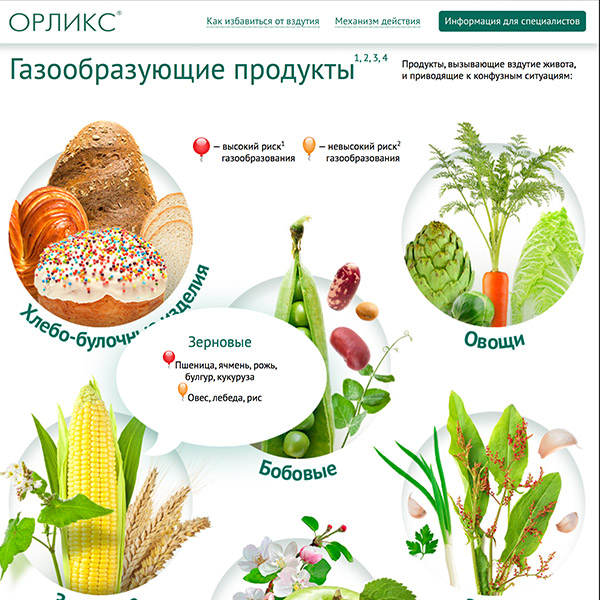
Valenta Described Ways to Make Healthy Food Comfortable
15.06.2016
In June 2016, Valenta launched a site of biologically active additive Orliks® (http://www.orliks.ru/), where experts consider a syndrome of alimentary flatulence (or abdominal distention) – this sensitive problem can sometimes become urgent. They explain in comprehensive form, how you can understand that you have distention, what food can cause it, and how to prevent the problem.
Abdominal distention (or flatulence) is excessive accumulation of gas in the intestines either because of increased gas generation or disturbances in gas absorption or removal. Alimentary (food) flatulence arises as a result of using food, which digestion is accompanied by increased gas generation in the intestines.
Even those who adhere to proper nutrition and healthy diet patterns can suffer from flatulence. The matter is that foodstuffs of plant origin (vegetables and fruits), which are the basis of healthy food and which are necessary and useful for our organism, feature some side effects, such as abdominal distention.
Our favorite vegetables, fruits and cereals are very useful to our organism. In particular, they are sources of complex carbohydrates – food fibers (cellulose). Food fibers are nutrient substances, which are not utilized by enzymes of our organism – instead they are broken down by useful intestinal bacterial flora. Consumption of appropriate volumes of cellulose normalizes functioning of the intestines. But! Before cellulose starts to perform its useful functions, there is a risk to face the dark side of its consumption. Most human enzymes fail to break down cellulose, thus it gets into the large intestine in almost indigested form and there, attacked by intestinal fluids, it often causes rumbling, gas generation and distention. This is the moment for Orliks® to act – it effectively helps organism to digest complex carbohydrates contained in beans, vegetables, fruits and cereals without generation of gas.
The following products feature high risk of gas generation, which can cause an embarrassing situation:
- vegetables and greens (artichokes, mushrooms, cauliflower, chicory);
- fruits (apples, apricots, blackberries, canned fruits, dates, dried fruits, figs, mangos, nectarines, papayas, peaches, pears, plums, persimmons, prunes, watermelons);
- cereals (wheat, barley, rye, gluten-free cereals used to limit food volume);
- pulses (soybean products, all kinds of beans, peas, lentil), cashews, bulgur, miso, pistachios;
- bakery products (rye-flour bread, Borodino bread, wholegrain bread, wheat bread).
